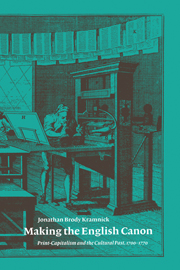Book contents
- Frontmatter
- Contents
- Acknowledgments
- Introduction: the modernity of the past
- Part One
- Part Two
- Chapter 3 Novel to lyric: Shakespeare in the field of culture, 1752–1754
- Chapter 4 The cultural logic of late feudalism: or, Spenser and the romance of scholarship, 1754–1762
- Part Three
- Afterword: the present crisis
- Notes
- Index
Chapter 3 - Novel to lyric: Shakespeare in the field of culture, 1752–1754
Published online by Cambridge University Press: 22 September 2009
- Frontmatter
- Contents
- Acknowledgments
- Introduction: the modernity of the past
- Part One
- Part Two
- Chapter 3 Novel to lyric: Shakespeare in the field of culture, 1752–1754
- Chapter 4 The cultural logic of late feudalism: or, Spenser and the romance of scholarship, 1754–1762
- Part Three
- Afterword: the present crisis
- Notes
- Index
Summary
The previous chapters argued that the description of the literary past evolved by the midcentury to an opposition between aesthetic and historicist discourse, and that this transformation emerged out of a prolonged consideration of the literary public sphere. This chapter follows this development into the treatment of Shakespeare during the early 1750s. The eighteenth century's peculiar interest in Shakespeare is well documented, as is the process, over the durée, in which Shakespeare became not just a precious oddity of the cultural past (an artless genius) but the national poet. What I would like to explore in this chapter is a particularly important episode in the century-long canonization of Shakespeare. I shall discuss how Shakespeare's unique status in the national canon – first among the trinity – came about because of the way his texts seemed to answer to a cultural dilemma: the relation of public culture to literary genres and language and to the past as such. For critics of the early 1750s, it was possible to imagine that Shakespeare was both antithetical to the market and a favorite of the nation's taste. The allure of Shakespeare for midcentury criticism (even for critics like Charlotte Lennox who used Shakespeare as the negative example to advance her case for the novel) derived in no small degree from the wealth of discussion surrounding his relation to contemporary readers.
- Type
- Chapter
- Information
- Making the English CanonPrint-Capitalism and the Cultural Past, 1700–1770, pp. 107 - 136Publisher: Cambridge University PressPrint publication year: 1999

